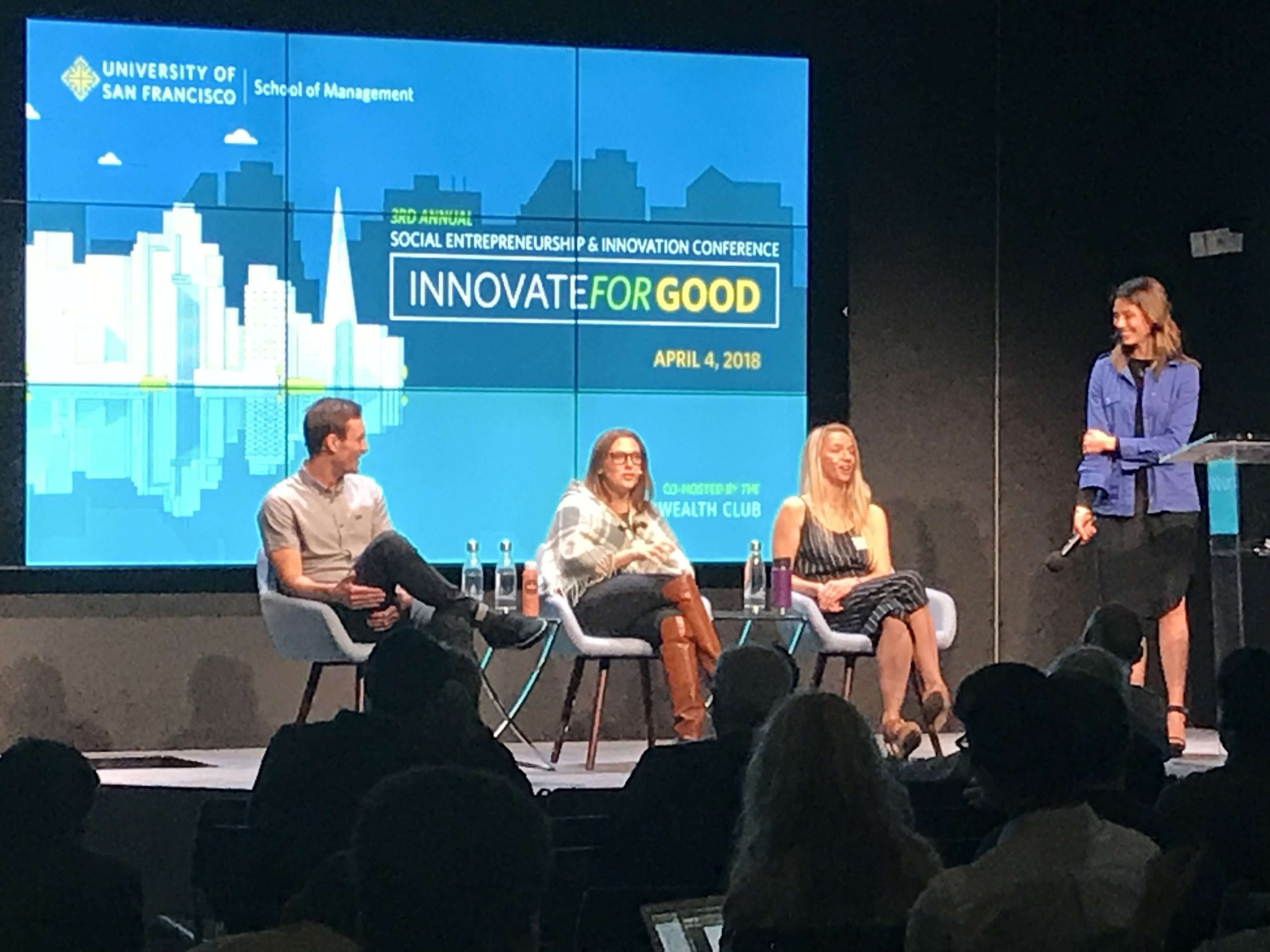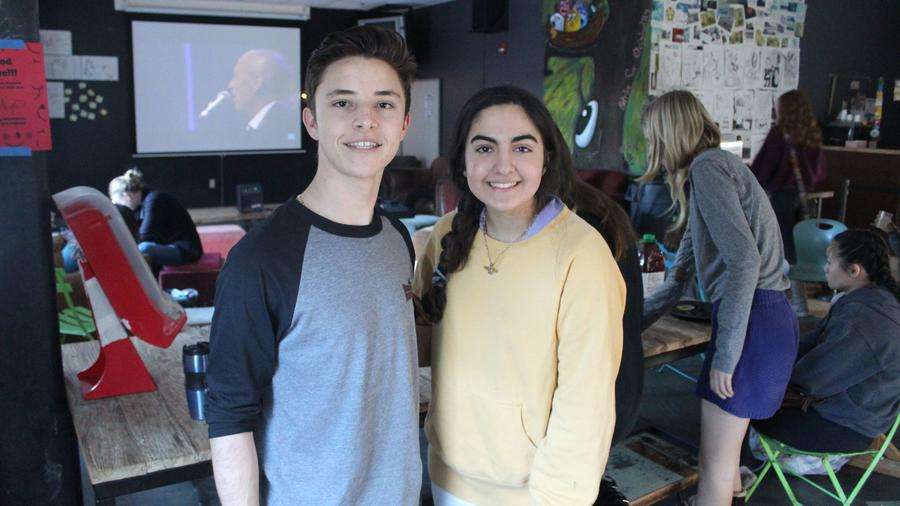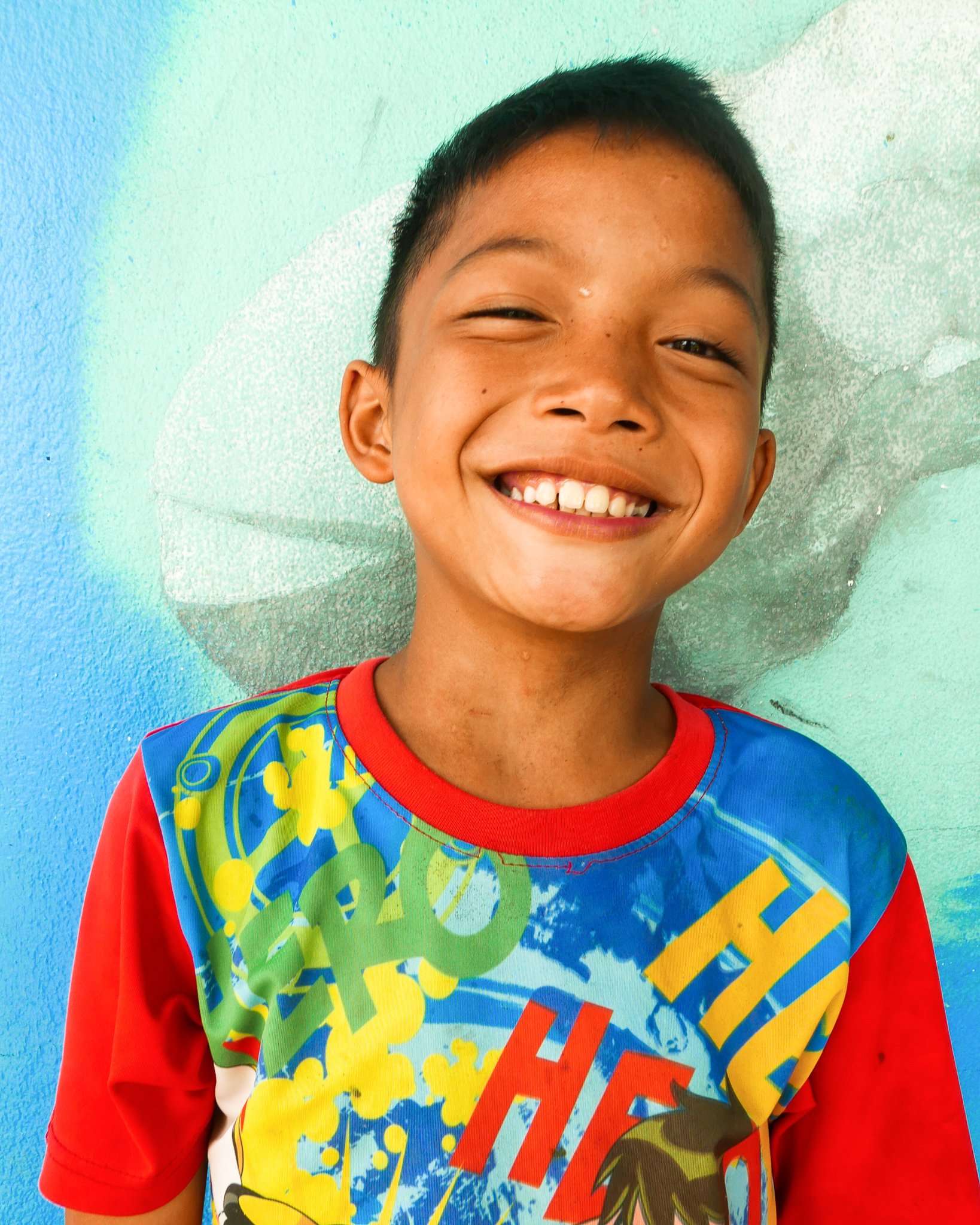Apr 24, 2018 | Blog, Innovate For Good, News From the Frontlines, Uncategorized
Today’s dose of #InnovateForGood inspiration comes from Velé co-founders Tiffany & Lauren. Velé is a Not For Sale partner brand that produces beautiful handcrafted leather goods under ethical guidelines, while spreading a message of women’s empowerment and contributing toward Not For Sale’s work around the world.

“You Are Worthy. You Are Wanted.”
These are the words that drove us to build Velé, an ethical leather essentials line designed with the belief that all are worthy, wanted.
Our creative partnership began fittingly in a middle school sewing class. We bonded over a shared love of essentialist style and the confidence that self expression through fashion fueled us with. Years later, it was only natural that we would venture into the world of fashion as a career. Yet we were disheartened to learn that in an industry that empowered us to conquer our day with confidence, less than 5% are paid a living wage out of over 50 million garment workers globally (The True Cost). The fashion industry has a seismic impact on the lives of many, and today there is a $150 billion industry of forced labour supported by fast fashion prices (ILO).
We looked at the stats, and knew that while we had fallen in love with the world of fashion for the way it could empower and unleash creativity, if we were going to start a brand, it would need to be a vehicle of bringing dignity to it’s makers. That’s why at Velé we guarantee the traditional artisans who handcraft every piece in Ubrique, Spain, fair living wages and are dignity in their work. To further this vision, 10% of each purchase supports Not For Sale in ending human trafficking.

“You Are Worthy. You Are Wanted.”
There was one more layer of fashion we wanted to change. We were tired of the industry constantly throwing messages at women that they weren’t good enough; that if they only purchased this or that, they would suddenly find success or feel beautiful. Velé is built on a foundation of supporting, respecting, and accepting women, regardless of their shape, size, or color. We make pieces to enhance your life, not change it.
That’s why every piece we make is embossed with a message of empowerment inside to remind you that no matter what the world is telling you, you are worthy, “You are wanted.”
Apr 12, 2018 | Blog, Innovate For Good, News From the Frontlines
How do we tackle the world’s most challenging problems through business and innovation?
That’s the question explored by over 200 attendees at the Innovate For Good Conference on April 4th, a joint conference held by Just Business, The University of San Francisco School of Management, and the Commonwealth Club. Speakers from various sectors of the business world took to the stage to engage in lively conversations about the interaction of profitable businesses and social good impact.
Here are 8 key takeaways from last week’s event:
If you missed out on attending this impactful event in person, you can watch a taped replay with subtitles here. And, stay tuned for our upcoming international Innovate For Good Conferences by signing up for our e-newsletter!
1. The enterprise can be the mission.
The lines are becoming blurred between “business only” and “non-profit only” mentalities. We’re in the 21st century, and we should be looking to enterprises to create a positive impact in the manner that they source their materials, produce their product, and engage their communities. Business can be the catalyst for change, if businesses are willing to go above and beyond to make an impact. As Dave Batstone, Not For Sale and Just Business co-founder shared; “We’re not talking about CSR, were not talking about charity, we’re talking about transforming business.”
2. Do the right thing for the right reasons.
If attaching a social cause to your business is only done for the marketing edge or to stroke your ego, it won’t be truly authentic, and it won’t evoke the genuine response and support that is so vital to creating thriving, viable business. Your mission should be so ingrained within your company’s DNA that it’s not even the main “selling point” of what you do. Your product or idea should be able to “sell itself” as an amazing product, first and foremost, without depending on a “cause” attached to it. As Jostein Solheim, CEO of Ben & Jerry’s shared, “Do ten amazing things and talk about one.”
3. Don’t do it alone.
A business on its own can’t change the world. However, companies can use their power and influence in the marketplace to join a collective effort to help change the status quo, set new standards, and influence the system. A company is only as strong as its loyal supporters, who also have a role to play – consumers who create a demand for more responsibly made products and more transparent and ethical business practices allow “good” companies to thrive and grow.

Zachary Batstone, Co-Founder of Z Shoes Organic, Rusti Porter, Sr VP of Marketing at REBBL, and Sarah Gordon, Co-Founder of Square Organics. Each of these panelists are radically transforming business through new methods of aligning profit with purpose.
4. Your professional path doesn’t have to be linear.
With many young, aspiring entrepreneurs in the room for the Innovate For Good Conference, Stripe’s Sarah Heck stressed the importance of following your own path and not someone else’s: “This can be a singular path, many different paths – as long as you’re following what you’re passionate about. If you have a good idea, find a way to make it so that you’re not impeded by barriers.”
5. Profit’s not the only thing in the equation anymore.
Younger generations are thinking differently about the way they’re building businesses. Instead of just focusing on profit, people are seeing problems and looking for opportunities to solve them. Established companies and new startups alike need to be aware of the concept of a “triple bottom line,” or a blended model that prioritizes other standards beyond profit, t consider the company’s impact on people and the planet, as the concept inches closer to becoming the new standard for doing business.
6. Entrepreneurs are everywhere.
Damian Bradfield, President of WeTransfer, stressed the thought that entrepreneurs are everywhere and geography is becoming irrelevant when it comes to building a team to execute an innovative idea. Companies can make an impact simply by expanding their horizons and looking outside Silicon Valley to discover the abundance of investable capital around the world. With this mindset, we can change how the business world sees countries like Uganda: as a place of investment, rather than a place for donation.
7. A compelling story is your company’s heartbeat.
Lisa Curtis, founder of Kuli Kuli, shared her belief with last Wednesday’s attendees that innovators must have a compelling story so that people can become invested in their idea. According to her, sharing the “why” of your company or idea will draw the right people to you who care about the same cause and will champion your idea. Lisa also underscored the importance of building the right relationships with funders and investors – “being picky” isn’t a bad thing! When looking for investors and even collaborators, ask, “Do they believe in your idea? Are they acting on behalf of impact? Are they willing to grow and share that sustained interest in your company?”
8. Don’t be paralyzed by perfection.
If you have an innovative idea, you have to find the right balance between creating a product or service that exudes excellence, and missing your opportunity to act at the right moment because too much time has been spent pursuing a perfect model. Mistakes are a growth opportunity for companies who are truly pushing the envelope and experimenting with new ways of creating positive impact. Jostein Solheim, CEO of Ben & Jerry’s, imparted wisdom on this topic in his keynote address; “We’re incredibly imperfect as a company. But that doesn’t stop us from acting. Don’t let perfection get in the way of doing things.”
We’re profoundly grateful for the wisdom shared by each and every participating innovator at the Innovate For Good Conference. For more information on how Not For Sale is exploring the potential of ethical business as a tool for empowerment and fighting global injustice, follow our #InnovateForGood Campaign on social media, sign up for our e-newsletters, and check out our sister organization, Just Business.
Mar 30, 2018 | Blog, News From the Frontlines
She is a defender of the forests in the Amazon against deforestation and illegal logging to extract latex from of Shiringa trees. Latex is often used to craft a multitude of products including in-trend clothing and accessories.
Maria has created a business selling handcrafted and sewn products such as handbags, backpacks, waterproof layers, uniforms, in a way that extracts latex from trees ethically without further destroying the Amazon. Maria crafts her products using a material called “vegetable leather” which is made with natural latex and cotton that has the same look and texture as animal leather.
In Maria’s workshop, a piece of newspaper hangs on the wall from the Artisan’s Association of Shiringa de Iberia. The articles describes very fashionable handbags made from “vegetable leather,” shown during a fashion show at the Salon de la Mode Ética in Paris. Although the women who craft the handbags don’t know a lot about today’s trends, they know extensively about hard work and the material they are crafting with.
Not For Sale admires Maria for creating a business that is socially and environmentally ethical and we continue to be inspired by her efforts to provide products that preserve and keep beautiful the world around her. #SheInspiresMe
Mar 26, 2018 | Blog, News From the Frontlines, Thailand
Meet Meta. Meta was one of the stateless children who grew up with Kru Nam, the project director in Not For Sale Thailand, who provided her the opportunity to go to school at 5 years old. Before meeting Kru Nam, Meta would sell flowers at night for her aunt, sometimes even staying out until 2 or 3 am. Between 10 and 11pm, Kru Nam and two others, Pi Pok and Kru Ake, would bring mats to the Tha Pae Gate in the city’s main square and engaged with street children through art and teaching them how to read and write. Meta would walk past this area each night when selling flowers and would sometimes even stop by and sit in on lessons if her aunt didn’t see her.
One day, Kru Nam visited her aunt’s apartment, and asked Meta if she’d like to go to school. Clinging to the opportunity, Meta immediately packed her bag and left with Kru Nam. Later, Meta was dropped off at a boarding school, where she describes having learned everything. When first arriving, Meta was unable to speak the Thai language, however she was still taken in and taught gradually. At the Buddhakasetra School, apart from receiving an education, Meta learned how to cook her own meals, how to live sufficiently and independently, and work hard.
Because of Meta’s hard work, she was able to attend college and was the first stateless child to graduate from a Thai university which ultimately allowed her to gain full Thai citizenship.
Today, Meta rescues at-risk and sick children off the streets of Thailand and provides them with the care that they need. #SheInspiresMe
Mar 23, 2018 | Blog, News From the Frontlines, Thailand
Kru Nam is the spirit of Not For Sale. Without her, we would not exist.
A mother and an artist, Kru Nam first got involved with the issue of human trafficking when she brought paints to children on the streets of Thailand, encouraging them to share their stories. What they painted shocked her– the images illustrated trauma that no child should know.
Kru Nam was determined to change the course of these children’s lives. The majority of them had left everything in their home countries to seek financial success in Thailand, but had gotten manipulated by traffickers to work in karaoke bars, where they were subject to sexual exploitation. Despite death threats from traffickers, Kru Nam traveled to Chiang Mai and drove her truck through the alleyways of red light districts, offering children inside the bars an opportunity to start over.
At the time, the only space Kru Nam could provide her children was her own half-built house. It was an infinitely better option than their previous situation, but still unsustainable. One night, the wiring short circuited and burnt down the house and everyone’s belongings.
Kru Nam was devastated by the tragedy, but still refused to give up. “Why would I have to surrender to destiny?” She felt bound to her children’s struggles and knew she would find a way to give them the futures they deserved– “I know this fight is hard, but there is no other choice.”
Her lifeline was a card with David Batstone’s email on it. Not even knowing what email was, she went to an Internet cafe and asked the other customers for help. They didn’t take her seriously but helped her write to the American, explaining her situation in English.
Four days later, Mark Wexler arrived in Thailand with $10,000 strapped to his body. Kru Nam became Not For Sale’s first project director.
Now, with Not For Sale’s help, Kru Nam runs a shelter for about 150 rescued street children, providing them with dormitories, medical care, basketball courts, an organic farm, a library, and a computer center. There have been many setbacks along the way, but she never let them slow her down. From being arrested countless times to arguing with school officials about stateless children’s right to education, she always put her kids’ safety above her own. Among the hardships, there have been incredible successes, such as seeing one of her children become the first stateless individual to graduate from Thai university.
We thank Kru Nam for her courageous sacrifices to the anti human trafficking movement. This Wednesday, we are honored to have this social justice warrior as our #WCW.
#NFSWomen #WomanCrushWednesday
Mar 21, 2018 | Blog, Innovate For Good, News From the Frontlines
As a community of entrepreneurs, we are highlighting the innovation (and perspiration!) that inspires the amazing enterprises we see all around us. And, most importantly, celebrating the impact that motivates the entrepreneurs and their work. You can also align profit and purpose through partnering with us or investing in companies that give back to Not For Sale.
Get more involved with Not For Sale.
Get involved or give to change the course of a life affected by modern slavery.

High school students like Shawdi Sani showcase their commitment to Not For Sale’s mission and capacity to #InnovateForGood.
Sani, a junior at Canyon Crest Academy in San Diego, took initiative to livestream Not For Sale’s March Kickback Sessions in her school’s study cafe.
On March 2nd, Aloe Blacc, Family of the Year, and Mt. Joy lent their voices for a great cause — in benefit of Not For Sale’s anti-trafficking efforts. You can watch the livestream on YouTube.
Before the concert, Sani presented statistics about human trafficking in San Diego in order to fully engage the audience with the topic at hand. The issue feels personal to Sani, who admits that she was initially shocked to learn the extent to which human trafficking affects her hometown– San Diego places 13 on the FBI’s list of US regions with the most reported cases of child sex trafficking.
“We need to erase the mindset that human trafficking only happens ‘over there’ and not near us. We need to be proactive and spread awareness,” Sani says. “I believe we need to discuss it and discuss ways of prevention to make sure that no one in our area is vulnerable or uninformed about the issue.”
Now, Sani plans to work with the Raven Abolitionists at Canyon Crest and the school’s Humanitarian Cause Club to put on a school-wide awareness based assembly in May, in which she will discuss how to recognize human trafficking signs and other prevention tips.
Not For Sale applauds Sani’s efforts to empower her community with information about how to stay safe and protect others from human trafficking’s far-reaching effects. Her initiative is a stellar example of how to #InnovateForGood!
Together, we #InnovateForGood to create a world without exploitation. We are creating the new model for how businesses can change the world. Your partnership with Not For Sale goes beyond simply donating — It means that impact is embedded within your business’ DNA.






